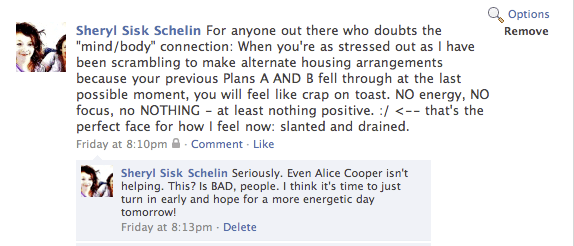Today’s post is aimed at a slightly different reader — not the fibromyalgia sufferer or any other chronic pain patient for that matter, but the friends of people with chronic pain.
The Gift of Friendship — The Challenge of Chronic Pain
I know it’s not easy being the friend of someone who’s in pain most or all of the time. You probably have a lot of mixed emotions about your friend’s new reality. You might be concerned for your friend’s prognosis. You may miss doing fun things together, or even resent how much of your friend’s time and attention her condition now consumes. You may even have some doubts about whether her health is really “that bad” — especially if she “doesn’t look sick.”
But you’re also in a wonderful position, in a way. You’ve got some objectivity, of course — the pain isn’t happening to you, so you can be an incredible source of guidance and feedback when it comes to trying new therapies or making adjustments to daily life. You’re also motivated by friendship and that means you’ve got compassion for your friend’s new challenges. That compassion is something all of us need from time to time, no one more so than a chronic pain sufferer.
Straight From the Horse’s Mouth: How You Can Be a Good Friend to a Chronic Pain Sufferer
I asked some of my “fibro-friends” on Twitter what they thought about this question: “What piece of advice would you give to someone who wanted to be a better friend to someone struggling with chronic pain?” The responses I got were incredibly moving and may help you in your quest to be a better friend.
Just Listen, Even When It’s Hard
First, they said, it would help tremendously if you would just be there for us. Be a shoulder to cry on, listen to us rant and whine on occasion when the pain stops us from doing what we really long to do. It’s hard to listen to someone you care about who’s in pain, we know, but your presence really does help. We need people to listen to us — to hear our stories — and to hear us with compassion. That’s something you can do better than anyone else.
Send Us Good Information, But Beware of Claims of “Cures”
Second, we welcome your interest in our condition. Please do keep emailing us news clippings that you find about our condition. But we do have one request: ignore the ones that say we can be “cured” with one simple supplement, or readily available substance.
For most of us, there is no cure yet, although researchers are constantly at work on these conditions and we’re all hopeful. The most that we can hope for in the immediate future, however, is successful management of our symptoms. So, check out the source of that article you’re thinking of sending. If it’s a press release, you can skip it. If it’s a true news piece, send it on.
Understand What We’re Talking About When We Say “We Hurt”
Third: please understand that our pain is not like the normal, average everyday aches and pains that almost everybody endures as they get older. This stuff is potent pain of the highest magnitude, and it interferes with everyday life.
When a fibromyalgia patient says she hurts or is experiencing a flare, for instance, you can understand what she’s going through by remembering what it feels like to have the flu — not the stuff you call the flu when you’re really just not feeling well and don’t want to go to work, but the honest-to-goodness, kills-people-every-year influenza. Remember those deep-rooted widespread body aches? That’s what a flareup feels like, only it doesn’t go away with Tylenol.
The One Thing You Should Never Say to a Chronic Pain Sufferer
So, while it’s perfectly normal to think “Well, everyone hurts now and then …” — keep that thought to yourself, please.
We know everyone hurts — but not everyone hurts like we hurt, and when you say things like that, it just makes us feel (A) terribly alone and (B) that you don’t believe us, that you think we’re just malingering. Please trust me: we’re not hypochondriacs or malingerers. We hope for nothing more out of life than one more good day, one pain-free day, and, please God, a cure for what ails us.
Grace Us With Your Presence
Finally, please don’t forget about us. It’s going to be hard, we know. Especially when we’ve both lived with this condition for awhile, and you start to realize that there’s really not much you can do to make us feel better, and there’s not much we can do to rejoin life as we used to know it.
You’re going to start telling yourself, “Well, there’s nothing I can do to help. And I know she doesn’t want to or can’t go do __________ (whatever you’ve got planned for the day).” Then, the next thing you know, you’re not calling or emailing, and we haven’t seen each other in ages.
Please resist that temptation. Even if you know we can’t join you, it still feels good to be invited from time to time.
And even though, yes, you’re right, there’s not much you can do to make us feel better, there is one thing you can do — and that’s grace us with your friendship and your presence. Call and see if you can just drop by for a chat. Tell us about fun things you’ve been doing — even if we seem envious, we’re really happy that we can at least live vicariously through you! Keep us in touch with what’s going on out there in your world, because we do care about you, even though it seems sometimes as if all we can think about is our chronic pain condition.
We need friendship, just as much as we need good pain relief and a caring, competent doctor. We hope that our pain doesn’t scare you off, because your friendship does mean so much to us. Take us as we are, but please don’t forget that underneath all the new stuff that any serious health condition brings, it’s still us in there — the same friend who’s loved you and relished your love for years.



